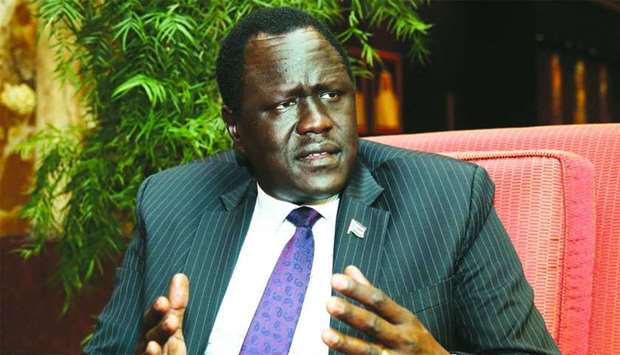*Qatar stressed its firm commitment to close co-operation in the field of oil and gas between the two countries, said the African country’s Minister of Petroleum
Qatar has "expressed interest" in looking at available opportunities in South Sudan’s hydrocarbon sector and in its upstream facilities, said the African country’s Minister of Petroleum, Ezekiel Lol Gatkuoth.
Gatkuoth who met with HE the Minister of State for Energy Affairs, Saad bin Sherida al-Kaabi in Doha on Monday said, “Qatar stressed its firm commitment to close co-operation in the field of oil and gas between the two countries.”
In an interview with Gulf Times, Gatkuoth said he had discussed with al-Kaabi "issues such as exploration of new blocks, enhancement of oil recovery production, capacity building programme for South Sudanese engineers and general co-operation in the oil and gas sector."
South Sudan has the third largest oil reserves in Sub Saharan Africa. The country has resumed oil production after disruption caused due to a five-year war, the minister noted.
Currently, South Sudan produces 180,000 barrels per day (bpd), he said and noted, “Our immediate priority is to boost our oil output to 270,000 bpd. We are working to hit the peak oil output of 350,000 bpd, which we had clocked once.”
South Sudan, whose oil sector accounts for nearly 90% of the country’s GDP, has proven reserves of 3.5bn barrels from three producing blocks: Dar Petroleum Operating Company (DPOC), Sudd Petroleum Operating Company (SPOC) and Greater Pioneer Operating Company (GPOC).
“Currently, only 12% of our reserves are explored. There are many oil-bearing blocks waiting to be explored. So, there is a very huge potential,” Gatkuoth said.
He said South Sudan was looking at setting up a 10,000-bpd capacity refinery in the country.
“That will take care of our domestic refining needs. Currently, we import refined oil and that’s expensive,” said Gatkuoth, who previously worked as South Sudan’s ambassador to the US.
He said South Sudan was looking at companies who could capture gas from oil production and monetise it.
“We have a zero-flaring and zero water discharge policy. We are aligned to the well-established global policies on protecting our environment,” Gatkuoth said.
He said South Sudan has established a Petroleum Protection Force to secure oil fields and pipelines from criminal activities.
“Among ourselves within South Sudan, we have an agreement in place to resume and increase the oil production. And with Sudan, we have an excellent relationship. Our leaders have agreed that the relationship between the two countries has to be advanced for the sake of our people.”
Currently, landlocked South Sudan exports its oil to China and Europe among other markets through an export facility owned by Sudan, from which it seceded in 2011. To the export facility, South Sudanese oil is carried through a pipeline that passes through Sudan.
Gatkuoth said he had invited minister al-Kaabi to visit the South Sudanese capital Juba.
He also met with QNB acting group chief executive officer Abdallah Mubarak al-Khalifa. QNB has a branch in Juba, the only Qatari company to have operations in South Sudan now.


